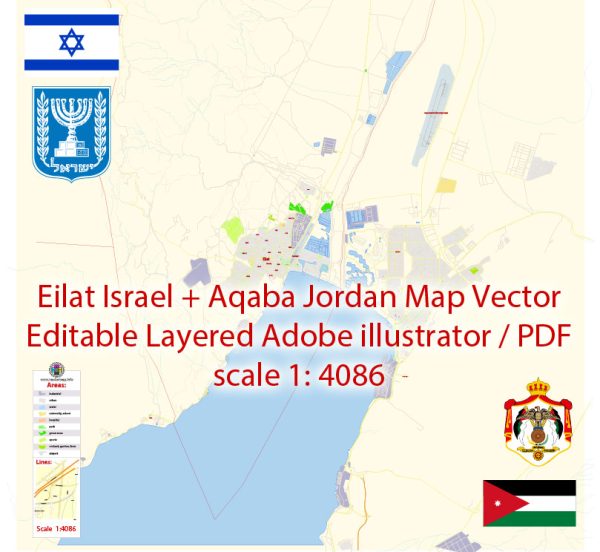Eilat in Israel and Aqaba in Jordan are neighboring cities located at the northern tip of the Red Sea, and they both have rich histories of urban development.
Eilat, Israel:
- Ancient History: Eilat has a history that dates back to ancient times, with archaeological evidence suggesting human presence in the region as far back as the 7th millennium BCE. It was an important port for trade and commerce, connecting the Red Sea with other regions.
- Nabatean and Roman Periods: During the Nabatean and Roman periods, Eilat served as a gateway for trade routes connecting the Red Sea to the Mediterranean. The Nabateans, a nomadic Arab people, established a settlement in the area, contributing to its economic and cultural significance.
- Modern Development: In the modern era, Eilat experienced significant development, particularly after the establishment of the State of Israel in 1948. It became a strategically important city due to its location at the southernmost tip of Israel and its proximity to the Red Sea.
- Tourism and Industry: Eilat is known for its tourism industry, featuring beautiful beaches, coral reefs, and a warm climate. The city has grown to accommodate hotels, resorts, and various entertainment facilities. Additionally, Eilat has become a hub for commerce and trade, facilitated by its location at the crossroads of Asia and Africa.
Aqaba, Jordan:
- Ancient and Biblical History: Aqaba has a long history, with evidence of human habitation dating back thousands of years. In biblical times, it was known as Ezion-Geber, an important port for trade and commerce.
- Islamic Period: During the Islamic period, Aqaba continued to be a strategic port, and its significance increased under the rule of the Islamic Caliphate. The city played a role in the trade routes connecting the Arabian Peninsula to the Levant.
- Ottoman Rule: Aqaba came under Ottoman rule in the 16th century, and during this time, the Ottomans developed the city further. Aqaba was an essential stop on the pilgrimage route to Mecca.
- 20th Century and Modern Development: In the 20th century, Aqaba became part of the Hashemite Kingdom of Jordan. The city has undergone modernization and development, with a focus on infrastructure, industry, and tourism. Special Economic Zones have been established to encourage economic growth and investment.
- Economic Free Zone: Aqaba has been designated as an Economic Free Zone, attracting businesses and industries. The city’s strategic location on the Red Sea contributes to its role as a major port, serving as a gateway for Jordan’s international trade.
Both Eilat and Aqaba have evolved from ancient trading posts to modern cities with a focus on tourism, industry, and commerce. Their histories are intertwined, reflecting the broader historical and cultural context of the Red Sea region.


 Author: Kirill Shrayber, Ph.D. FRGS
Author: Kirill Shrayber, Ph.D. FRGS